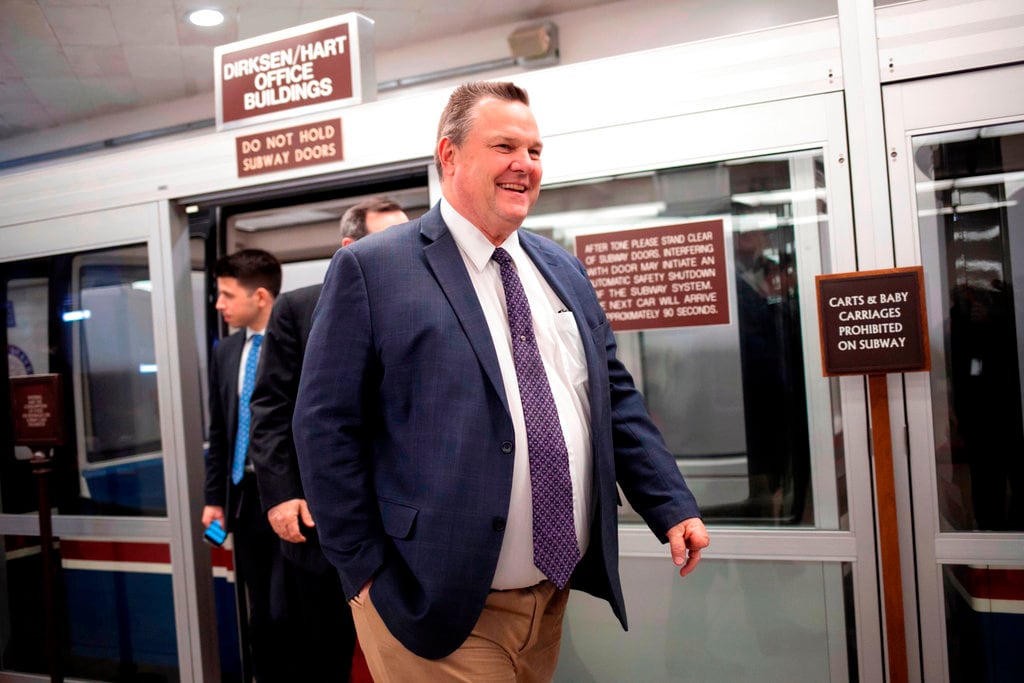WASHINGTON ― It’s unlikely Congress will make a sweeping, indiscriminate cut to the defense budget, despite economic pressure from the coronavirus pandemic, according to the Senate Armed Services Committee chairman.
“We’re going to deal with a much tighter budget going forward, more flat I think than rising, but within that I think we have to make judicious calls about what is worthwhile,” Sen. Jack Reed, D-R.I., told reporters Wednesday. “As far as across-the-board cuts, I do think there are more policy pronouncements than there are good policy.”
Progressive lawmakers are expected to restart a push to slash the Pentagon budget’s top line, set at $741 billion last year. But Reed would be a powerful opponent, likely alongside lead Republicans on the defense panels and House Armed Services Committee Chairman Adam Smith, D-Wash.
The curtain is rising on a budget cycle with some fresh dynamics. Though Democrats control the White House and Congress, their slim majorities in both chambers suggest an alliance of centrist Democrats and Republicans will shepherd defense spending and policy bills into law.
The Congressional Progressive Caucus, which tried last year for a 10 percent defense reduction targeting everything other than pay, wants to use the money to boost nondefense spending, a category that covers everything from health and education to foreign aid and housing.
“It is a top issue for the CPC,” the group’s chairwoman, Rep. Pramila Jayapal, D-Wash., recently told The Hill. “This is a really important moment for us to move forward on cutting out waste, fraud and abuse in the Pentagon.”
RELATED

Senate Budget Committee Chairman Bernie Sanders, I-Vt., a key player in last year’s effort, which Reed opposed, recently told Politico he will use his new gavel to take a “hard look at fraud” at the Pentagon.
“Spending $740 billion a year on this one piece of the federal budget is unconscionable” in light of the economic damage wrought by the coronavirus, Sen. Elizabeth Warren, D-Mass., said at SASC hearing earlier this month. “A budget is about priorities, and we continue to over invest in defense while under investing in public health and so much more that would keep us safe and that would save lives.”
On the other side of the Capitol, House Armed Services Committee ranking member Rep. Mike Rogers, R-Ala., said he wants to see a defense increase of 3-5 percent annually, and vowed to fight against any broad cut.
HASC Chairman Smith has said he couldn’t support an across-the-board defense cut without a new strategy to support it. He told Defense News in October that he backs “a center-left, pragmatic approach” to securing a strong military, though he predicted a flat budget ― which is what President Joe Biden has signaled he’s planning.

Within that top line, Reed ― a day after holding his first hearing as chairman on emerging technologies ― expressed openness to the military finding savings and reprioritizing in favor of equipment, training and research. In that scenario, lawmakers’ parochial interests will have to take a back seat.
“There are legacy systems, which all the services have asked us to eliminate, and there’s certain reluctance because they’re stationed in our home states or they have an impact. So we’ve got to look, and if there’s a tighter budget, we have to look harder,” Reed said.
The acquisition program for the F-35 fighter jet, built by Lockheed Martin, will see scrutiny, but Reed demurred when asked if, amid testing delays, he’d oppose Congress’ practice of adding more F-35s to the budget. The Pentagon will tell Congress how many aircraft it needs, and Congress will hunt for efficiencies, he said.
“We need to look at the F-35 program, and it goes to engine reliability, it goes to finishing the combat testing and evaluation, which is long overdue,” Reed said. “I think those assessments will play into our decisions about the F-35 because we cannot just sit back and wait much longer for operational testing and full acceptance by the Air Force. We’re very much concerned about sustainment cost, how can we restructure that.”
Pressure from some Democrats has been mounting against the Pentagon’s planned program to replace intercontinental ballistic missiles with the Ground Based Strategic Deterrent, a program awarded to Northrop Grumman last year and expected to top $260 billion over its life span.
RELATED

But Reed said lawmakers would seek savings within B-21 bomber and Columbia-class submarine programs, and he voiced support for the triad of nuclear capabilities.
“We have to modernize the triad and maintain the triad, in my view, for strategic reasons that have been successful for about 70 years,” Reed said, adding that he hopes the U.S. will engage Russia and China in arms control talks.
Republicans, led by Rogers and Oklahoma Sen. James Inhofe, SASC’s ranking member, urged Biden and other Democrats in an opinion piece Thursday not to pursue “unilateral disarmament” in the face of Russian and Chinese nuclear weapon development efforts.
“Don’t forget: back in 2011, it was President [Barack] Obama who began a multi-decade, just-in-time effort to update America’s nuclear forces and revitalize its weapons design and production facilities,” they wrote. “He clearly recognized that inaction would mean the loss of our nuclear deterrent and the acceptance of risks our country has not had to contemplate in more than seven decades.”
Joe Gould was the senior Pentagon reporter for Defense News, covering the intersection of national security policy, politics and the defense industry. He had previously served as Congress reporter.







